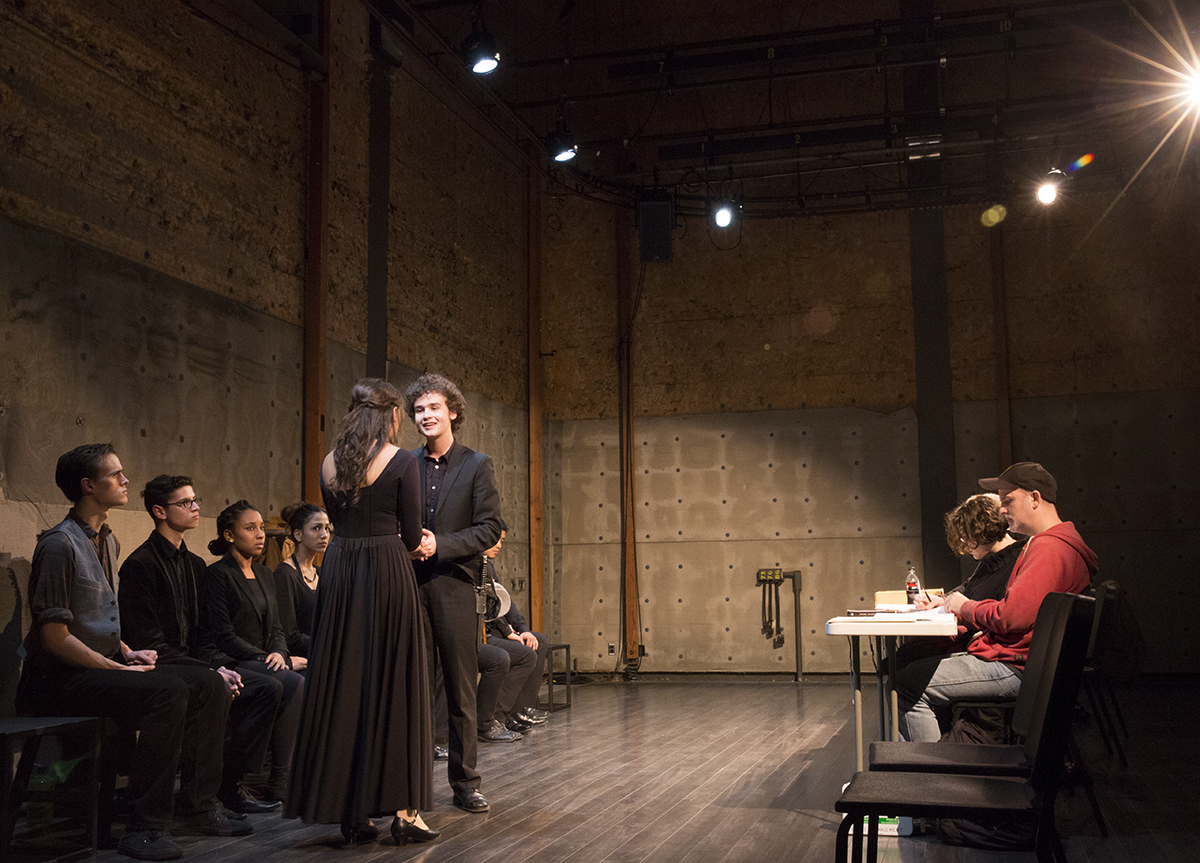UCLA Department of Theater to put on ‘Double Falsehood’

UCLA’s Department of Theater will perform its rendition of the 18th-century play “Double Falsehood.” Written by English playwright Lewis Theobald, the play focuses on love, mistrust and relationships.
By Shreya Aiyar
Jan. 29, 2014 12:00 a.m.
A royal family and the court walk onto the stage, clad in rich ornamental accessories that accentuate their regal demeanors. Suddenly, a duke’s attendant drapes himself in a white cloth and transforms, right in front of the audience and his companions, into a shepherd, and the show goes on uninterrupted.
The effortless switching from character to character comes after months of hard work and adjustment. As part of the winter performance season, undergraduates from the Department of Theater will perform a rendition of the 18th-century play “Double Falsehood.” The show will be held in the UCLA Theater Lab in Melnitz Hall, and highlights the skills of cast members that morph from one character to another in a matter of seconds.
Written by English playwright Lewis Theobald, who based the story on a theatrical collaboration between William Shakespeare and John Fletcher, “Double Falsehood” portrays the intertwining stories of two sons, Roderick and Henriquez, of a royal Spanish family and their love interests, Violante and Leonora. After Henriquez commits an act of outrage against Violante for refusing his advances, the characters find themselves deep in the titular double falsehood of love and betrayal.
In planning the production, the department made a decision to restrict the size of the cast of actors, said Fatima Elbashir, a third-year musical theater student and an actor in the production. The choice to use a small cast freed up limited performance space in the Theater Lab but also resulted in two actors, Elbashir and Anthony Sorrells-Yager, playing five and six different characters, respectively.
Sorrells-Yager, a first-year theater student, said playing many characters was initially difficult but became an exciting learning experience not only for himself and Elbashir, but also for the entire cast and crew.
“It’s almost like finding different keys to unlock the doors to these different people’s personalities in one quick moment,” Sorrells-Yager said. “With so many characters out there for such a short amount of time, it’s a matter of jumping in headfirst.”
The characters in “Double Falsehood” span a wide socioeconomic spectrum, ranging from royalty to shepherds, dressing and speaking accordingly, said Casey Holmberg, a fourth-year theater student and an actor in the play.
In switching between characters, Sorrells-Yager said minor props, such as a piece of long white cloth that changes a king to a shepherd, transform a character into another but can make it challenging to recognize the character change.
To help actors and audiences keep up with the rapidly shifting characters, director Paul Wagar taught the actors to differentiate between their characters not just through dress, but also through speech patterns characteristic of their differing statuses.
Sorrells-Yager said the accent that the shepherds and people of lower status use in the production approximates the way a Californian teenager would speak in normal conversation, with special attention put on slightly blurring words and sentences together.
On the other hand, the English dialect that characterizes the speech of the royalty and affluent in the production is particularly clear and enunciated, said Rachel Rivera, a fourth-year theater student who plays Violante in the production.
“(The dialect) isn’t used very much; it’s a very clear way of speaking,” Rivera said. “It’s like how news anchors speak – it’s a very concise, clear and open sound, and that’s what we’ve been learning under (Wagar) for the last three quarters.”
Sorrells-Yager said the varying social statuses of the characters give the actors a history lesson in classical theater, as well as teach them to adapt rapidly to on-the-spot costume and dialect changes.
“It’s all about being fast and daring,” Sorrells-Yager said. “You have to dare to fail, but you also have to learn how that teaches you how you’re doing in the moment.”
Rivera said she hopes that the audience sees the maturation of each character through the mix of intricate storylines as they struggle through trials of love, mistrust and relationships.
“All of us mature from a horrible point A to a content point B,” Rivera said. “I want to be able to show effectively that all the characters are making their own decisions and being able to find solace in solitude.”

